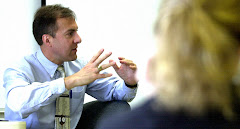Larry Norman’s not gone. His music, so we’re seeing in the media response to his death, is too tightly woven into the generations he influenced. Funny how death brings life.
If anything, Larry Norman has been rediscovered in ways that remind us of the hard questions he raised — ones that won’t go away.
Norman’s web site said he died Sunday at 2:45 a.m. with his younger brother Charles and Charles’ wife holding his hands, waiting for his heart to slowly stop beating. He was 60. He had been struggling since the 1970s from a steadily weakening heart and the effects of head injuries from an airplane cabin accident. Media reports said debris that fell on him affected his brain. And then there had been diabetes.
“I feel like a prize in a box of cracker jacks with God’s hand reaching down to pick me up,” Norman said in the last moments of his life. Allen Fleming, a friend of Norman’s typed the words into Norman’s laptop as he lay dying.
The message ends with a kind of poem — or another lyric.
Goodbye, farewell, we’ll meet again
Somewhere beyond the sky.
I pray that you will stay with God
Goodbye, my friends, goodbye.
________
The enormity of Norman’s musical and cultural influence cannot be traced in gold or platinum as might be the case with other rock pioneers. Part of what kept Norman from selling more recordings was his discomfort with labels — the kind recording companies make and the kind media tend to create.
Larry Norman burst on the music scene in the 1960s with nearly white blonde hair — grown down past his chest — a furrowed brow, and a perpetual pout. His tight, thin lips protruded when he sang in a nasal growl. His sound was a mix between Elton, Guthrie, Mick, and Dylan. Norman’s was bluesy folk and sometime-rock at a time when these were tools of cultural vernacular used by youth banging the bars of cages set up by adults around them.
Norman’s first two solo albums, “Upon This Rock,” released on Capitol in 1969, and “Only Visiting This Planet,” released on Verve in 1972 have been called the first significant Christian rock albums in the United States. Their energy was the quiet, simmering fury of chords and lyrics calling young people to take their faith to the streets. Know the Bible, prove it; do something about it, his music said.
Larry Norman’s war was against sin and hypocrisy — rigid complacency — in the rapidly growing evangelical church in the post-World War II era. He made an appeal to non-Christians, too. Bloggers and a reported outpouring of emails to his web site indicate many came to know Christ from listening to Larry’s music. Frank Black, of the Pixies, was working on an album with Norman at the time of his death. “Larry was my door into the music business, and he was the most Christlike person I ever met,” Black said in a statement Monday. But what set Larry Norman apart was his challenge to a regimented culture of Protestant evangelism, worship music, and the “pleasant valley Sunday” that the Monkees had sneered about in his time.
Larry Norman’s reputation came as much from his singing and songwriting as from his spoken words. He had a reputation from the beginning for talk during concerts. Rather than banging out songs seamlessly,one to the next, Norman interjected comments. They could take a while. Concert-goers would be challenged to leave a changed people: more humble, more sensitive God’s voice, more mindful of the pain in those around them.
“Why should the Devil have all the good music?” went the refrain of one Norman song. It was a piece filled with a smirk and a growl at those who failed to see past external appearances in the hippie era.
They say to cut my hair/ they’re driving me insane/
I grew it out long to make room for my brain/
They say rock-and-roll is wrong/
we’ll give you one more chance/
I say I feel so good I want to get up and dance
______
As in all of life, those who were closest to Norman were the first to find out he’d gone. Mark Joseph, who wrote a book about the fading of Christian rock, was among the
first to note Norman’s passing on Bullypulpitnewst.com, a blog run from Southern California. Joseph’s obituary for Norman ran on huffingtonpost.com on Tuesday of the week Norman died.
National Public Radio, that Thursday, posted an unsmiling photo of Norman from what looks like the 1970s, along with an interview with Charles Norman. In that interview, Norman’s brother recalled growing up with a big brother bold enough to rock with gusto, grow his hair long and write about sin in ways that transcended metaphor.
In one song, Norman wrote,
Gonorrhea on Valentine’s Day/
And you’re still looking for the perfect lay/
Why don’t you look into Jesus/
He’s got the answers
“Stuff like that that shocked uptight Christians,” said Charles Norman in the NPR interview. And he was right. Many Christian bookstores — primary outlets for Christian music in the era when Norman was exploding on the music scene — refused to carry his albums. Not that this bothered him, outwardly anyway. Rejection became a kind of ongoing theme of Norman’s life. His style, it seemed, almost invited it.
Randy Stonehill, a friend of Norman’s who came to faith through Norman’s life and music ministry turned down a Christianity Today interview, but used his own web site to tell the world that one tragedy of Norman’s life was his inability to maintain relationships. Norman was married twice, the second time to Stonehill’s former wife. Larry Norman’s trajectory through ministry, like that of many artists, was one that put passion before people. His was a great heart — but one that took a beating and did some beating of its own.
The odd thing about Norman's death was the utter silence of those who were so integral to his early career. Where was Tom Howard? Steve Camp? All those who had mixed and mingled with him at Jesus festivals through the 60s and 70s?
No comment. Too hard, maybe. No need.
Media reports by the Associated Press, the (Portland) Oregonian, the (San Jose) Mercury News, Entertainment Weekly and Christianity Today played down the broken heart angle. But it was there nonetheless. In the end, Larry Norman’s heart couldn’t take any more — a kind of metaphor of the songwriter’s life. He’d been about putting heart and soul before people in auditoriums, stadiums, rock festivals, and sound-stage coffee shops around the world.
Maybe the deafening silence from most evangelicals at his passing came from Norman's penchant for leaving places. His emergence on the music scene as a Christian rocker came after leaving the San Jose psychedelic band People! From there, he came and left a lot. It made him a loner — though one who had real musical talent, perhaps genius. But genius in isolation can look like dementia, an aberration.
Some media reports caught the nuance that Norman was a man without an ideological country. Rock-and-roll writers and pop culture critics generally ignored him. So did the Christian media. His music would have had as much appeal — maybe more — than such noted pioneers as Roger Daltrey, Robert Plant and Jimi Hendrix. Norman toured with some of them in the 1970s. “He really could’ve been a star if he were singing about something other than Jesus,” said Willman. And Willman’s writing sounds an almost mournful tone about such a decision.
Rebels have a tough life. They thrive on an anger that works best at low simmer. But if they live with that anger, it tears them up — maybe kills them. At best, it drives them from others. So it was with Larry Norman. He toured a lot — right up to the end, even in his weak condition. He released records on his own label or small ones run by others. But it was work in the back side of the desert, a work apart.
At the end, like many of his musical generation, Norman spent more time watching and listening than speaking. Like a good prophet, he sat back and watched as events came together as he’d predicted.
Within days of his death, a report by the Pew Forum on Religion and Public Life suggested a large number of Americans were reporting that their pursuit of God was something they didn’t want crammed into a box — boxes Norman had spent his younger years decrying. One of the fastest areas of growth in American religious experience was one that defied survey description. Norman would have liked that trend.
Norman’s web site said a funeral would be held the Saturday after his death at The Church on the Hill in Turner, Oregon. “My plan is to be buried in a simple pine box with flowers in it,” Norman had said just before he died.
In a kind of foreshadowing of what his end might be like, Norman wrote, in “Why Should the Devil Have All the Good Music”
I’m not knocking the hymns/
Just give me something that moves my feet/
I don’t like those funeral marches/
I’m not dead yet
Later in the song, Norman wrote,
They nailed him to the cross/
And they laid him in the ground/
But they should’ve known you can’t keep a good man down.
As Norman’s own funeral took place — squarely in the season of Lent — the notion of resurrection seemed a fitting descriptor for a life that made spiritual redemption a cornerstone of musical journey.
Has the world figured out all that Larry Norman was trying to be and do? Probably not.
Nor does it need to. The next generation of fury and counterculture has raised enough questions of its own.
And this is as it should be.
Subscribe to:
Post Comments (Atom)



No comments:
Post a Comment